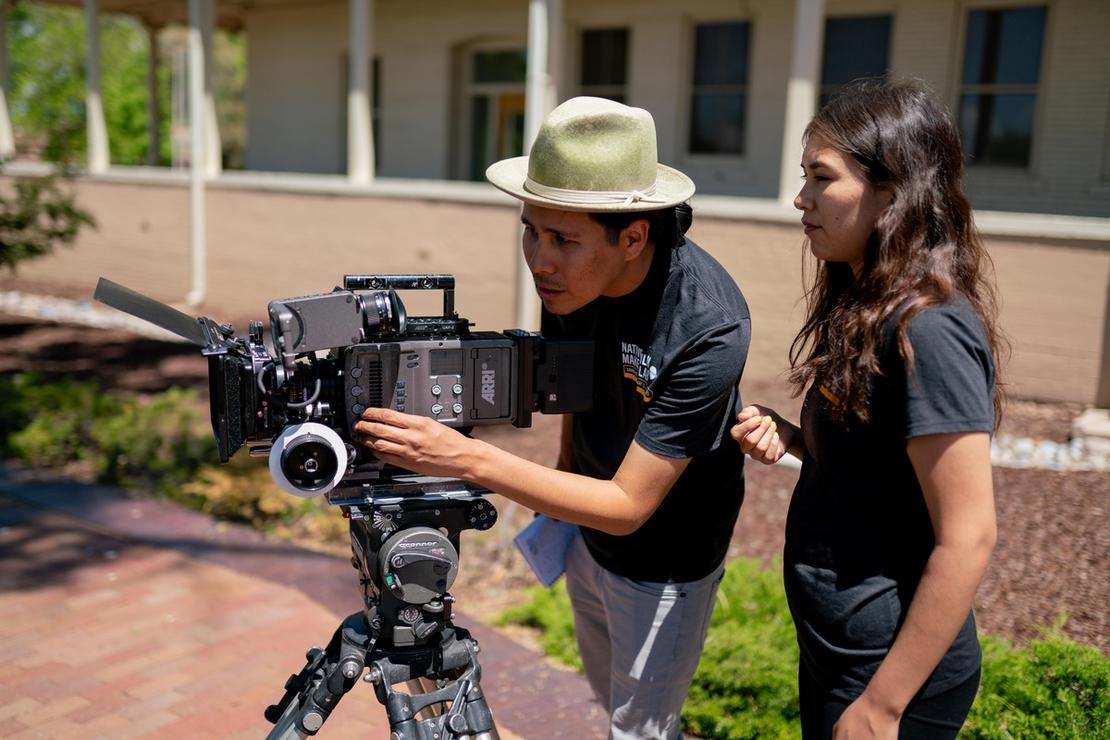
- Details
- By Kaili Berg
Indigenous filmmakers will come together on April 29 in Sante Fe, New Mexico, for the 2024 Sundance Institute Native Filmmakers Lab, a week-long program designed to empower and elevate their voices in the world of cinema.
Led by Adam Piron (Kiowa/Mohawk), Director of the Sundance Institute's Indigenous Program, the program aims to empower Indigenous voices in cinema through tailored sessions with advisors. The lab will offer workshops, feedback sessions, and roundtable discussions to enhance participants' skills and deepen their understanding of their craft.
"The Native Lab has a rich history of supporting Indigenous filmmakers and artists for generations since its founding. Its unique approach involves intensive sessions with advisors, tailored to elevate the voices and projects of indigenous artists to the next level,” Piron told Native News Online.
One of the foundational aspects of the Native Filmmakers Lab is its emphasis on Indigenizing creative practices. Throughout the week, participants will be encouraged to explore how they can infuse their work with elements of Indigenous culture and tradition, creating stories that are both authentic and impactful.
“What sets the native lab apart is our commitment to meeting artists where they are and empowering them to pursue their creative vision without constraints,” said Piron. “Rather than imposing a one-size-fits-all approach, we tailor our support to each artist's unique needs and aspirations. We prioritize authenticity and cultural resonance, ensuring that Indigenous perspectives remain at the forefront of the storytelling process.”
Past participants of the Native Filmmakers Lab include acclaimed filmmakers such as Sterlin Harjo, director of “Reservation Dogs”; Sky Hopinka, visual artist and filmmaker known for works like “Kicking The Clouds”; and Erica Tremblay, director of “Fancy Dance”.
“Over the years, we've had the privilege of witnessing the growth and success of many talented indigenous filmmakers who have participated in our lab. Their journeys serve as inspiring examples of the impact our program can have in nurturing Indigenous talent and amplifying Indigenous voices on a global scale,” Piron said.
Beyond the lab itself, the Sundance Institute's Indigenous Program offers ongoing support and resources to Indigenous filmmakers, helping to foster their growth and success long after the event has ended. Participants will receive a $10,000 grant to support their projects, with the goal of helping them take their work to the next level.
Additionally, participants become part of a community of Indigenous filmmakers, with opportunities to showcase their work at the Sundance Film Festival and connect with industry professionals and funders.
“Looking ahead, our goal is to continue expanding opportunities for indigenous artists and fostering a more inclusive and equitable landscape in the film industry,” said Piron. “By providing ongoing support, mentorship, and resources, we hope to bring positive change and create lasting impact in Indigenous storytelling for generations to come.”
More Stories Like This
Watermark Art Center to Host “Minwaajimowinan — Good Stories” ExhibitionMuseums Alaska Awards More Than $200,000 to 12 Cultural Organizations Statewide
Zuni Youth Enrichment Project Takes Top Emerging Artist Apprentices to Phoenix for Artistic Exploration and Cultural Immersion
From Dishwasher to Award-Winning Chef: Laguna Pueblo's Josh Aragon Serves Up Albuquerque's Best Green Chile Stew
Rob Reiner's Final Work as Producer Appears to Address MMIP Crisis
Help us defend tribal sovereignty.
At Native News Online, our mission is rooted in telling the stories that strengthen sovereignty and uplift Indigenous voices — not just at year’s end, but every single day.
Because of your generosity last year, we were able to keep our reporters on the ground in tribal communities, at national gatherings and in the halls of Congress — covering the issues that matter most to Indian Country: sovereignty, culture, education, health and economic opportunity.
That support sustained us through a tough year in 2025. Now, as we look to the year ahead, we need your help right now to ensure warrior journalism remains strong — reporting that defends tribal sovereignty, amplifies Native truth, and holds power accountable.
 The stakes couldn't be higher. Your support keeps Native voices heard, Native stories told and Native sovereignty defended.
The stakes couldn't be higher. Your support keeps Native voices heard, Native stories told and Native sovereignty defended.
Stand with Warrior Journalism today.
Levi Rickert (Potawatomi), Editor & Publisher


